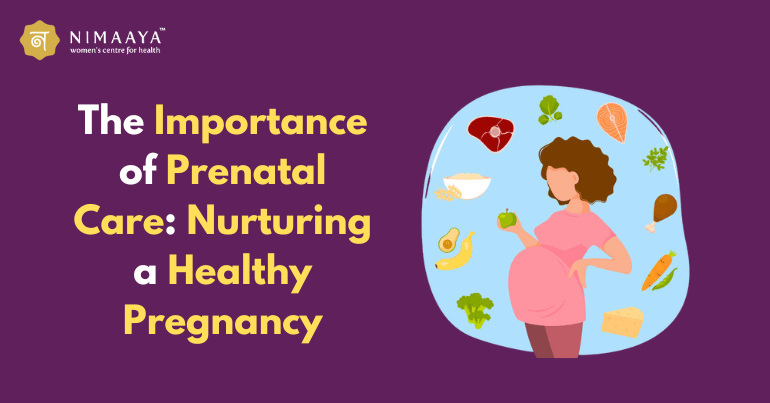Welcoming a new life into the world is a profound journey, and the foundation of a healthy pregnancy begins with proper prenatal care. In this article, we will delve into the critical aspects of prenatal care, elucidating its definition, various types, and the overarching Importance of prenatal care it holds in ensuring a smooth and healthy pregnancy journey. From understanding the objectives of prenatal care to exploring its advantages and potential disadvantages, we aim to equip expecting parents with the knowledge needed to nurture the well-being of both mother and baby. So, let’s embark on this insightful exploration into the world of prenatal care.
Prenatal Care Introduction:
The journey commences with understanding the very essence of prenatal care. In simple terms, prenatal care refers to the medical attention and guidance a pregnant woman receives throughout her pregnancy. It’s not merely a series of doctor’s appointments; rather, it’s a comprehensive strategy that addresses the physical, emotional, and psychological aspects of pregnancy.
Prenatal Care Definition involves recognizing it as a personalized healthcare plan tailored to meet the specific needs of the expectant mother. It encompasses a spectrum of services, including regular check-ups, screenings, and guidance on lifestyle choices. By integrating medical expertise with emotional support, prenatal care strives to create a nurturing environment for the growing life within.
Importance of Prenatal Care
The importance of prenatal care cannot be overstated, and it extends far beyond the routine check-ups. Here are five key reasons why prioritizing prenatal care is essential for a healthy pregnancy:
5 Importance of Prenatal Care:
① Early Detection of Complications:
Regular screenings and check-ups enable healthcare providers to identify and address potential complications early on, minimizing risks to both mother and baby. These proactive measures form a crucial aspect of prenatal care, allowing healthcare professionals to intervene promptly and implement necessary interventions, thereby safeguarding the health and well-being of both the expectant mother and the developing fetus.
② Optimal Fetal Development:
Proper prenatal care ensures that the developing fetus receives the necessary nutrients and support for optimal growth and development. This includes monitoring the mother’s nutrition, administering essential supplements, and conducting regular ultrasounds to track the fetus’s growth milestones throughout the pregnancy.
③ Reducing the Risk of Preterm Birth:
Monitoring the pregnancy closely helps identify factors that may contribute to preterm birth, allowing for interventions to reduce this risk. Implementing timely interventions and addressing potential risk factors through vigilant monitoring during pregnancy is crucial for minimizing the likelihood of preterm birth.
④ Managing Maternal Health:
Prenatal care involves monitoring the health of the expectant mother, addressing any existing medical conditions, and providing necessary support to ensure a healthy pregnancy. This meticulous management extends to routine screenings, nutritional guidance, and emotional well-being, creating a comprehensive framework for safeguarding maternal health throughout the entire pregnancy journey.
⑤ Preparation for Labor and Delivery:
Education and guidance provided during prenatal care equip expectant parents with the knowledge and skills needed for a smoother labor and delivery experience. Anticipating and addressing potential challenges, this preparation encompasses pain management techniques, birthing options, and postpartum care, fostering a sense of confidence and readiness for the transformative journey of labor and delivery.
Prenatal Care Procedure:
The procedural aspects of prenatal care are multifaceted. The journey typically begins with an initial consultation, where the healthcare provider gathers relevant information about the mother’s health and medical history. Subsequent visits involve a series of check-ups, ultrasounds, and screenings to ensure the optimal development of the fetus. Nutritional counseling, exercise guidance, and emotional support are seamlessly woven into the fabric of this comprehensive care plan.
Prenatal care follows a structured procedure that encompasses various elements to guarantee comprehensive support for the mother and the growing baby:
• Initial Assessment:
A detailed examination at the beginning of the pregnancy to assess the overall health of the mother and identify any risk factors.
• Regular Check-ups:
Ongoing appointments to monitor the baby’s growth, assess the mother’s health, and address any concerns.
• Screenings:
Diagnostic tests and screenings to identify potential issues, such as genetic abnormalities or developmental concerns.
• Nutritional Guidance:
Personalized advice on maintaining a balanced and nutritious diet to support the health and development of the baby.
Types of Prenatal Care:
Prenatal care is not a one-size-fits-all approach. It is tailored to meet the unique needs of each pregnancy. The four primary types of prenatal care include Routine Prenatal Care, High-Risk Prenatal Care, Midwifery-led Care, and Collaborative Care. Each type addresses specific concerns, ensuring a personalized approach to maternal health.
4 Types of Prenatal Care
① Routine Prenatal Care:
The most common type involves regular check-ups, screenings, and counseling to monitor the health of the mother and baby. During routine prenatal care, healthcare providers meticulously track the progress of the pregnancy through a series of scheduled check-ups, ensuring that any potential issues are identified and addressed promptly. Screenings, an integral part of these check-ups, allow for the early detection of complications, while counseling sessions provide valuable guidance on maintaining a healthy lifestyle throughout the gestation period.
② High-Risk Prenatal Care:
In cases where there are known risk factors or complications, specialized care is provided to manage and mitigate potential challenges. This specialized form of care, known as high-risk prenatal care, involves close monitoring, tailored medical interventions, and collaborative efforts between healthcare providers to navigate the complexities associated with pregnancies that pose elevated risks.
③ Midwifery-led Care:
Midwives play a crucial role in providing personalized care, focusing on the emotional and social aspects of pregnancy. Their expertise extends beyond medical interventions, fostering a supportive and empowering environment for expectant mothers throughout their pregnancy journey.
④ Collaborative Care:
This involves a team of healthcare professionals working together to ensure comprehensive and integrated care for the expecting mother. This collaborative approach may include obstetricians, midwives, nutritionists, and mental health specialists, all pooling their expertise to tailor a personalized care plan that addresses the unique needs of each expectant mother.
Aims and Objectives of Prenatal Care:
Understanding the aims and objectives of prenatal care illuminates its purpose. Firstly, it aims to monitor the health of both mother and baby, detecting and addressing any potential issues early on. Secondly, it provides education and guidance on healthy lifestyle choices, nutrition, and emotional well-being. Lastly, it prepares expectant parents for childbirth and the responsibilities of parenthood.
Advantages of Prenatal Care:
Ⓐ Reduces Pregnancy Complications:
Regular monitoring and interventions significantly reduce the risk of complications during pregnancy and childbirth.
Ⓑ Enhances Neonatal Outcomes:
Adequate prenatal care is associated with improved neonatal outcomes, including a lower risk of preterm birth and low birth weight.
Ⓒ Supports Maternal Well-being:
Prenatal care addresses maternal health concerns, contributing to a healthier and more comfortable pregnancy experience.
The overarching benefits of prenatal care extend beyond the immediate pregnancy journey. These include: empowering parents, Facilitates Early Intervention, and Strengthening the Bond between Parents and babies. Prenatal care empowers parents with knowledge, enabling them to actively participate in decisions related to their pregnancy. Early detection and management of potential issues contribute to better outcomes for both the mother and the baby. The journey of prenatal care fosters a strong emotional bond between parents and their unborn child, creating a foundation for a nurturing family environment.
Disadvantages of Prenatal Care:
While the advantages of prenatal care are evident, it’s crucial to acknowledge that some individuals may face challenges accessing or receiving adequate prenatal care. Factors such as socioeconomic disparities, geographical constraints, and cultural barriers can contribute to disparities in care. Recognizing these challenges is essential for developing strategies to address and overcome them.
In the Words of Nimaaya IVF Center:
Nimaaya IVF Center, a beacon of excellence in reproductive healthcare, emphasizes the pivotal role of prenatal care in fertility and assisted reproduction. Their commitment to guiding expectant parents through every stage of pregnancy reflects a holistic approach to maternal health, aligning seamlessly with the overarching importance of prenatal care.
Conclusion:-
In the tapestry of parenthood, prenatal care emerges as the vibrant thread that weaves health, knowledge, and preparedness. From routine check-ups to specialized interventions, prenatal care lays the groundwork for a thriving pregnancy journey. It’s a proactive investment in the health and well-being of both the mother and the unborn child. From routine check-ups to emotional support, prenatal care weaves a tapestry of holistic healthcare, ensuring a flourishing pregnancy and a healthy start to the miracle of life. As we champion Nurturing a Healthy Pregnancy in Nimaya IVF Center, let us envision a future where every expectant mother receives the care and support she deserves, nurturing not just a pregnancy but a lifetime of well-being.



